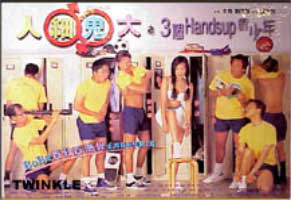Growing Up

Reviewed by Dr. Kari Maund
Growing Up (Yan Sai Gwai Daai Ji Saam Goh Handsup
Dik Siu Nin) 1996
Directed by Chin Man-Kei, written by Man Jun (Manfred
Wong) and Lam Chiu-Wing; produced for B.O.B by Man Jun and Andrew Lau Wai-Kong.
An irritatingly erratic film which seems unable
to decide between nostalgia and teen comedy, Growing Up, rather sadly, encapsulates
almost everything I find irritating about B.O.B films: weak scripting, shallow
characterisation and all-round laziness. Presented with a short framing sequence
set in 1996, the film goes on to describe the experiences in his final year
of high school in 1986 of Kar-Lok (Jason Chu Wing-Tong) and his two friends
Kat-Lung (Michael Tse Tin-Wah) and Zhi-Wei (Jerry Lam Hiu-Fung). Kar-Lok
is a stereotypical ‘good boy’ from a nice home, who tries in a nice but unconvincing
way to curb the equally stereotypical excesses of his dimmer friends, but
finds his world view shaken with the arrival at school of new girl Mei-Qi
(Hsu Qi), who has a shady present and a shadier past, and comes from the
wrong side of town. With a sharper script and some better acting, particularly
from Chu, this could have had the makings of a Hong Kong Risky Business,
but instead the script goes for cheap laughs and soapy plotting, with a tendency
simply to give up on dialogue and action altogether and play Cantopop whenever
things might get difficult.

The basic plot hinges on the developing romance between Kar-Lok and Mei-Qi,
and the problems arising from their different experiences and background.
Hsu Qi is convincingly charming, but Jason Chu fails to provide steady support
for her, and few of their scenes rise above cliché as a result. Her
character, moreover, is both underwritten and hackneyed: the ‘good bad girl’
who can be redeemed by the love of a Really Nice Boy. No real attempt is
made to come to terms with the implications of her past of gangs and prostitution:
Kar-Lok’s safe middle-class world is presented as an easy and obvious cure
for all such ills. Mei Qi is more commodity than person, her very idea of
love and security adapting and changing according to the nature of the man
she is with, and no-one within the film questions the rightness of this.
Thus she progresses from demanding mistress of a wealthy business man, to
street-smart sidekick of a two-bit gangster, to sweet girlfriend of the class
good boy, her own identity seemingly elided and irrelevant at all points.

That Hsu Qi achieves a measure of consistency is a tribute to her talent:
the script and situations are no help to her in presenting a rounded character.
The main romance is counter-pointed both by Mei Qi’s dealings with her other
lovers – businessman Simon Poon and gangster Shi-Wei (Jordan Chan Siu-Chun
in a throwaway role) – and by the background relationships of Kat-Lung and
Zhi-Wei, which are underdeveloped and, in the case of Zhi-Wei, played solely
for slapstick. Assorted older character actors drift in and out of the film
(there is a nice cameo from what looks to be veteran kung-fu actor Wang Lung
Wei as Kar-Lok’s father, and an irritatingly hammy appearance by Tsui Kam-Kong)
but add little of substance. The plot wanders, rather than progressing, and
new challenges repeatedly prove as insubstantial and as trivial as marshmallow.

Some good elements appear amidst the overall morass. Mei-Qi’s relationship
with Simon Poon is nicely played and sensitively handled, so that all parties
involved, including Poon’s neglected and ageing wife Judy, emerge sympathetically.
This section alone might easily have been worked up into an effective and
affecting film. By contrast, Mei-Qi’s relationship with gangster Shi-Wei
is tired: the film, unsurprisingly, has nothing new at all to observe in
this genre. Jordan Chan, with possibly the worst haircut in the entire film,
brings surprisingly little lift to his scenes, and his confrontations with
Kar-Lok are without bite or menace. It is hard not to speculate that his
appearance in the film was simply to fill out the complement of Cantopop
band Wing Fire Sea. The other background relationship, between Kar-Lok’s
‘good bad boy’ friend Kat-Lung, and class good girl Shi-Min has some charm:
Michael Tse brings the right balance of mouthy arrogance and fear of rejection
to his few romantic scenes, and Shi-Min (?Li Si-Man?) is given a pleasantly
quirky and rebellious edge. The early scenes of teen-culture in 1986 have
some entertaining cultural references (characters dressed as Mark Gor and
so forth).

But the negatives on the whole outweigh the positives. Jason Chu Wing-Tong
is hopelessly miscast in the lead, unable to rise above the script, and too
often upstaged by his supporting cast. Jerry Lam Hiu-Fung is thrown away
in yet another ‘funny fat-boy’ role: the film might have worked rather better
had director and producers cast aside the anxiety to present pretty faces
and cast Lam in the lead. Michael Tse Tin-Wah gives a typically erratic performance,
ranging from excellent to uncontrollable, and upstaging Chu in several places.
There are too many crude sight gags, cheap shots and easy solutions, an the
final product is both saccharine and patronising, assuming that the audience
will settle for pop stars and flash in place of solid plotting and a sound
script.







